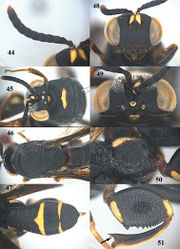Leucospis aequidentata
| Notice: | This page is derived from the original publication listed below, whose author(s) should always be credited. Further contributors may edit and improve the content of this page and, consequently, need to be credited as well (see page history). Any assessment of factual correctness requires a careful review of the original article as well as of subsequent contributions.
If you are uncertain whether your planned contribution is correct or not, we suggest that you use the associated discussion page instead of editing the page directly. This page should be cited as follows (rationale):
Citation formats to copy and paste
BibTeX: @article{Ye2017ZooKeys, RIS/ Endnote: TY - JOUR Wikipedia/ Citizendium: <ref name="Ye2017ZooKeys">{{Citation See also the citation download page at the journal. |
Ordo: Hymenoptera
Familia: Leucospidae
Genus: Leucospis
Name
Leucospis aequidentata Ye & van Achterberg & Yue & Xu, 2017 sp. n. – Wikispecies link – ZooBank link – Pensoft Profile
Type material
Holotype, ♀ (SCAU), CHINA, “Guangdong, Shaoguan, Chebaling, 22–28.VII.2008, Zai-fu Xu, No. 2016000345”. Paratypes: 1♀, CHINA, Guangdong, Shaoguan, Chebaling, 22–28.VII.2008, Zai-fu Xu, No. 2016000372 (SCAU); 20♀, CHINA, Hunan, Hupingshan National Nature Reserve, 10–13.VII.2009, Qi Yang, No. 2016000196–2016000199, 2016000201–2016000215 (SCAU, RMNH); 12 ♀, CHINA, Hunan, Hupingshan National Nature Reserve, 10–13.VII.2009, Qing-hui Yi, No. 2016000067 (BMNH), 2016000068 (BMNH), 2016000070 (BMNH), 2016000072, 2016000075, 2016000117, 2016000118, 2016000120, 2016000121–2016000124 (SCAU); 53♀1♂, CHINA, Hunan, Hupingshan National Nature Reserve, 8–12.VII.2009, Shi-hong Wang, No. 2016000085, 2016000088, 2016000090, 2016000091, 2016000097, 2016000098, 2016000100–2016000104, 2016000106–2016000110, 20160001112, 2016000113, 2016000116, 2016000148–2016000151, 2016000153, 2016000155–2016000166, 2016000168–2016000185, 2016000190 (SCAU, KYUN, USNM, ZISP, ZMUC); 5♀1♂, CHINA, Hunan, Hupingshan National Nature Reserve, 8–15.VII.2009, Xin Yuan, No. 2016000078–2016000082, 2016000091 (SCAU); 2♀, CHINA, Hunan, Hupingshan National Nature Reserve, 10–13.VII.2009, 9.VII.2009, Ya-li Tang, No. 2016000126, 2016000127 (SCAU); 4♂, CHINA, Fujian, Minqing, Huangchulin, 13–17.VII.2005, Jing-xian Liu & Li-qiong Weng, No. 2016000043, 2016000045–2016000047 (SCAU, RMNH); 1♂, CHINA, Hubei, Jingshan, 15.VII.2009, Yuan Ye, No. 2016000042 (SCAU).
Diagnosis
Body mainly black (Fig. 34), with exception of ventrally yellow antennal scape, pronotum with short yellow stripe, wings dark brown, hind coxa with yellow patch baso-dorsally, hind femur with subtriangular yellow patch baso-ventrally, and small obscure reddish yellow spot apico-dorsally, T1 with deep red mark antero-dorsally, T4 with transverse yellow stripe, T5 with transverse yellow stripe (Figs 34, 38, 43, 47); pronotum with strong discal carina and premarginal carina, first one arcuate, latter one straight (Figs 34, 36, 43, 45); dorsellum raised medially and without carinae (Figs 37, 46); hind femur with fourteen teeth ventrally, forming a regular row (Figs 42, 51); concavity below apical spine of hind tibia with rather robust spines and shorter setae (Figs 42, 51, 79); T1 angularly protruding dorsally with deep ovipositorial furrow on top of it and laterally medium-sized smooth interspaces between moderately coarse punctures (Figs 34, 37, 38); dorsal length of T5 0.8 times dorsal length of T1; ovipositorial furrow distinctly impressed on T4 (Fig. 38); ovipositor sheath long, nearly reaching to anterior margin of T1 (Figs 37, 38).
Description
Holotype. Female. Body length 15.0 mm. OOL= 1.4 POD; POL= 2.6 POD; MS= 2.8 POD.
Head. Coarsely and densely punctate, with dense and short pubescence (Figs 39, 40). Flagellomeres (except first segment) of female hardly narrowed basally (Figs 34, 35).
Mesosoma. Pronotum, mesoscutum, mesoscutellum, dorsellum, mesopleuron, metapleuron and propodeum coarsely and densely punctate, with dense short pubescence (Figs 34, 36, 37). Discal carina and premarginal carina well developed, first one arcuate, latter one straight (Fig. 36). Dorsellum without carina, rounded posteriorly (Fig. 37). Hind coxa moderately punctate (but less densely dorsally and no obvious smooth band), and with short pubescence, carinate postero-dorsally (Fig. 41). Hind femur with regular row of fourteen teeth ventrally, basal one largest (Fig. 42). Hind tibia produced into a spine ventro-apically, concavity below apical spine of hind tibia with rather robust spines and rather short setae (Figs 42, 79). Propodeum with weak median carina.
Metasoma. Moderately punctate, with dense short pubescence. T1 narrower than T4 or T5 in dorsal view. Ovipositorial furrow deep on T1, T4 and T5 (Fig. 38). Ovipositor sheath long, nearly reaching anterior margin of T1 (Figs 37, 38).
Colouration. Head black (Figs 39, 40). Antenna black, with scape yellow ventrally (Figs 35, 39). Pronotum black, with short and arcuate yellow stripe in front of discal carina (Fig. 36). Mesoscutum, mesoscutellum, dorsellum, mesopleuron, metapleuron and propodeum black (Figs 34, 37). Wings dark brown (Fig. 34). Hind coxa black, with yellow patch baso-dorsally (Fig. 41). Hind femur with subtriangular yellow patch baso-ventrally, and small obscure reddish brown spot apico-dorsally (Fig. 42). Metasoma black, T1 with dark reddish brown mark antero-dorsally, T4 with transverse yellow stripe anteriorly, T5 with transverse yellow stripe posteriorly (Fig. 38); yellow stripe of T5 in lateral view at most about as broad as apical black part of tergite (Fig. 34).
Male. Body length 8.0–11.0 mm. OOL= 1.5 POD; POL= 2.3 POD; MS= 1.7 POD. Body punctation and colouration very similar to female (Figs 43–51), but yellow stripe of T5 in lateral view much broader than apical black part of tergite (Fig. 43).
Variation
Colouration of female: sometimes scape yellow entirely, mesoscutellum with transverse yellow patch posteriorly, or a pair of obscure yellow patch posteriorly, hind tibia with yellow patch dorsally. Body length of female: 13.6–17.5 mm. Colouration of male: sometimes scape entirely black.
Biology
Unknown. Collected in July.
Distribution
China (Fujian, Guangdong, Hubei, Hunan).
Etymology
Named after the regular row of teeth of the hind femur.
Original Description
- Ye, X; van Achterberg, C; Yue, Q; Xu, Z; 2017: Review of the Chinese Leucospidae (Hymenoptera, Chalcidoidea) ZooKeys, (651): 107-157. doi
Images
|




